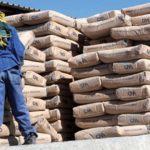As costs of building materials such as cement, rods, and others continue to rise in Nigeria, experts have underscored the need for the creation of policies and systems that promote investment and sustainable growth of the construction industry.
Their advice comes as Nigerians lament the unprecedented hike in costs of building materials, especially cement. Between December 2023 and February 2024, the price of a 50kg bag of cement has risen by 150 per cent from N5,000 to N15,000.
Join our WhatsApp ChannelThe situation prompted the federal government through the Minister of Works, Engr David Umahi, to summon cement producers in Abuja on Monday, February 19, to ascertain the causes of the price hike. At the end of the meeting, the minister read a communique where he disclosed that cement manufacturers identified challenges such as high energy and transportation costs, bad roads, smuggling of cement to neighbouring countries, and forex crisis. Umahi said the federal government has noted their challenges and would work towards resolving them, adding that cement manufacturers have agreed to reduce price to between N7,000 and N8,000 per bag.
READ ALSO: Real Estate Crisis: How BUA Cement Price Rose 150% In 4 Weeks, Mgt Jerks Up Staff Salary By 50%
Speaking in an interview with Prime Business Africa, an estate developer, Prince Adelaja Adeoye, highlighted the impact of high costs of building materials on estate development across the country.
Adeoye expressed concerns that the high costs of building materials could discourage investment in the real estate sector.
He said: “The impact of the rising cost of cement and other building materials in Nigeria on the real estate sector is significant. As prices soar, construction projects become more expensive, leading to increased costs for developers and potential buyers alike. This surge in costs can deter investment in real estate development and limit access to affordable housing for many Nigerians.”
The realtor noted that major cement producers have been having challenges of low supply due to infrastructural challenges, and regulatory setbacks which hinder their ability to meet the growing demand across the country.
“Producers like Dangote, BUA Cement, and Lafarge have not been able to adequately address the low supply of cement to the public, exacerbating the situation. Despite being major players in the industry, challenges such as infrastructural limitations, regulatory bottlenecks, and operational inefficiencies have hindered their ability to meet the growing demand for cement in the country.
“Furthermore, Nigeria’s foreign exchange (FX) crisis has added another layer of complexity to the issue. Fluctuations in the value of the Naira, coupled with limited access to foreign currency, have made it difficult for cement producers to import raw materials and machinery, leading to disruptions in production and further constraining supply.
“Overall, the combination of rising costs, supply constraints, and FX challenges has created a challenging environment for the real estate sector in Nigeria.”
READ ALSO: Why Cement Price Keeps Rising – Producers
He advised that addressing these challenges would require concerted efforts from both the government and industry stakeholders “to improve infrastructure, streamline regulatory processes, and implement policies that promote investment and sustainable growth in the construction industry.”
Statistics showed that the construction and real estate sectors had a positive growth trajectory in 2022, leading to expert predictions that it would expand further. However, adverse economic conditions which manifested in the form of inflation and high building materials costs led to an opposite result. According to the National Bureau of Statistics report, real estate services contributed 4.46 per cent to the nominal GDP in the first quarter of 2023, as opposed to 4.92 per cent in the same period in 2022 and 5.62 per cent in 2022’s fourth quarter. With this, analysts described the year 2023 as one of the toughest for the real estate sector.
As the cost of building materials have shut beyond what it was in 2023, there are fears that 2024 might be the worst if the challenge of high cost is not adequately addressed, at least before the end of the first quarter.
“All our construction projects are currently on hold now as our clients are complaining of inability to afford the high cost of materials now,” Engr Ebuka Eze, CEO of Earth Works Construction Services told Prime Business Africa correspondent in a telephone interview.
“From N5,000 it moved to N6,5000, from N7,000 to N8,000 and now it has jumped to N13,000, and it keeps adding money almost on daily basis,” Eze lamented.
The Engr said the reason given by their cement suppliers for the latest price hike was that they have not gotten supply from depots in recent times. “The retailers supplying us cement for our works said for some time now, they have not gotten supply from depots, and the little ones they have, they have been forced to increase the price because they are certain that by the time depot owners open, there will be a further price increase and it will be difficult for them to buy and sell if they sold old stock at a lower price.”
He said apart from cement, the costs of rods and other reinforcement materials have also increased.
“We now buy one piece of 12 mm rod at N14,500 against N9,000 it was sold some months ago,” Engr Eze added.
Commenting on the impact of the rising cost of building materials, an economist and lecturer at the Niger Delta University, Dr Wisdom Selekekeme Krokeyi, said the increased cost of building materials would have a far-reaching impact on the economy.
He said apart from an increase in demand, and supply chain disruptions, market speculations also influence the hike in cost of building materials.
The economic expert observed that high building material costs would reduce the number of new construction projects and slow down the pace of infrastructural development.
He said: “When construction cost rises, it can affect real estate price because the higher cost of production will lead to higher cost of rent and therefore making people seeking accommodation unable to afford a decent accommodation in future. Same with those renting shops for businesses. This will generally affect housing supply.”
Continuing, Krokeyi explained that “the economic growth of course will also be affected because the construction industry will be significantly affected because housing or construction industry contributes significantly to the growth of the economy. So, higher construction costs will lead to slower construction activity and that could have a broader implication on economic growth and even unemployment in related industries. Inflationary pressures will also set in because rising costs of building materials can contribute to inflationary pressures on the economy and thereby affecting consumer purchasing power and potentially lead to higher interest rates as the central bank needs to control inflation.”
He advised that to address these challenges, “Policymakers need to consider measures to mitigate the impact of rising cost of construction materials.”
He said they need to deploy measures that promote efficiency in the supply chain of cement and other building materials, and also invest in infrastructure to support the production of building materials “and of course, implementing policies to support affordable housing development is also very important at this time.”
He advised estate developers to adopt cost-saving measures or explore alternative building materials that equally offer high-quality output, while also focusing on “sustainable and energy and efficient consumption practices that will also help mitigate the impact of rising material costs.”
Victor Ezeja is a passionate journalist with seven years of experience writing on economy, politics and energy. He holds a Master's degree in Mass Communication.



















Follow Us